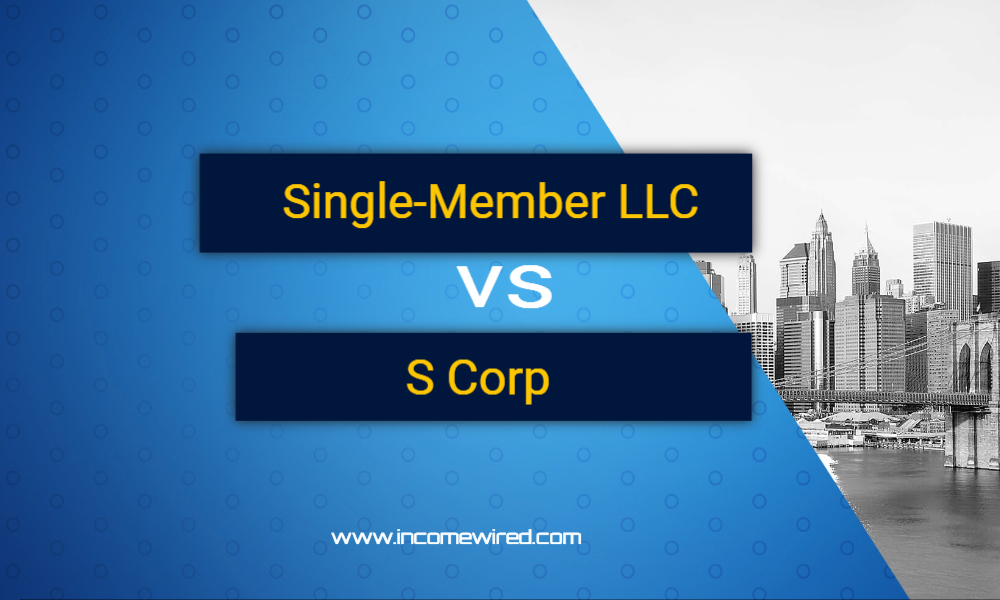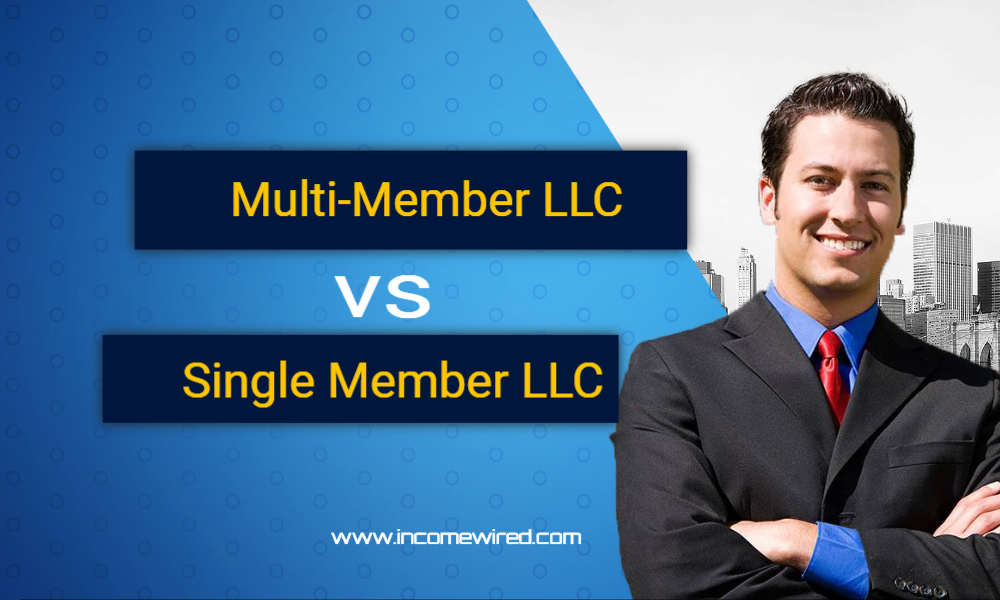we help service-based business owners, freelancers, and aspiring businesses with our content & services & When readers purchase services discussed on our site, we often earn affiliate commissions that support our work. Find out more about Income Wired
After some thought and research, you’ve decided to form a single-member LLC. But what kind of business entity should you choose? Here’s a quick rundown of the single-member LLC vs S corp debate.
As the name implies, a single-member LLC is an LLC with only one owner. An S corporation, on the other hand, is a corporation that has elected to be taxed as a pass-through entity. In other words, the business’s profits and losses are “passed through” to the shareholders, who then report them on their individual tax returns.
What is an LLC?
An LLC, or limited liability company, is a business entity that offers its owners limited liability protection. This means that if the LLC is sued or incurs debt, the owners’ personal assets are not at risk.
LLCs are relatively easy to set up and maintain, and they offer flexibility when it comes to how the business is structured and taxed. For these reasons, LLCs have become a popular choice for small businesses.
What is an S corporation?
An S corporation is a regular corporation that has elected to be taxed as a pass-through entity. As with an LLC, the business’s profits and losses are “passed through” to the shareholders, who then report them on their individual tax returns.
S corporations offer several advantages over regular corporations, including the fact that they’re not subject to double taxation (the corporation itself is not taxed on its profits, only the shareholders are). S corporations are also eligible for certain tax breaks, such as the qualified business income deduction.
Single member LLC vs s corp
There are a few key differences between single-member LLCs and S corporations that you should be aware of before making your decision.
For one, single-member LLCs are not subject to the same corporate income taxes that S corporations are. This is because single-member LLCs are treated as sole proprietorships for tax purposes. As such, they are only subject to self-employment taxes, rather than corporate income taxes.
Another key difference is that single-member LLCs have more flexibility when it comes to how they are structured and managed. This is because LLCs are not subject to the same legal and regulatory requirements as corporations. For example, single-member LLCs are not required to have a board of directors or hold annual shareholder meetings.
Finally, single-member LLCs may have an easier time qualifying for certain tax breaks and deductions than S corporations. This is because the IRS treats single-member LLCs as pass-through entities for tax purposes. As such, they may be eligible for certain business tax deductions that S corporations are not.
Single Member LLC:
- not subject to corporate income taxes
- more flexible when it comes to structure and management
- may have an easier time qualifying for certain tax breaks and deductions
S Corporation:
- taxed as a pass-through entity (profits and losses are “passed through” to shareholders)
- required to have a board of directors and hold annual shareholder meetings
- may be ineligible for certain business tax deductions
How is an LLC structured?
An LLC can be structured in a variety of ways, depending on the needs of the business. For example, an LLC can be structured as a single-member LLC or a multi-member LLC. Single-member LLCs have only one owner, while multi-member LLCs have two or more owners.
LLCs can also be structured as either a partnership or a corporation. Partnerships are the most common type of LLC, and they are typically used by businesses that have multiple owners. Corporations, on the other hand, are typically used by businesses that have a single owner.
How is an S corporation structured?
An S corporation is structured in much the same way as a regular corporation. It has a board of directors and shareholders, and it is required to hold annual shareholder meetings. However, there are a few key differences between S corporations and regular corporations.
One of the most important differences is that S corporations are not subject to double taxation. This means that the corporation itself is not taxed on its profits – only the shareholders are. This can provide significant tax advantages for S corporations.
Another key difference is that S corporations have special rules when it comes to ownership. For example, S corporations can only have 100 shareholders or less. Additionally, all of the shareholders must be U.S. citizens or resident aliens. These restrictions help to prevent S corporations from being used for tax avoidance purposes.
What are the benefits of an LLC?
LLCs offer a number of advantages, both for businesses and for business owners. For businesses, LLCs provide flexibility when it comes to management and ownership. Additionally, LLCs are not subject to the same legal and regulatory requirements as corporations. This can make them simpler and easier to operate.
For business owners, LLCs offer personal liability protection. This means that if the business is sued or incurs debt, the business owner’s personal assets are protected. This is not the case with sole proprietorships or partnerships, where the business owner’s personal assets are at risk. Additionally, LLCs can provide tax advantages, depending on how they are structured.
What are the benefits of an S corporation?
S corporations offer a number of advantages, both for businesses and for business owners. For businesses, S corporations provide certain tax advantages. Additionally, S corporations are not subject to double taxation. This can save the business money.
For business owners, S corporations offer personal liability protection. This means that if the business is sued or incurs debt, the business owner’s personal assets are protected. Additionally, S corporations can provide tax advantages, depending on how they are structured.
What are the disadvantages of an LLC?
There are a few potential disadvantages to consider when forming an LLC. First, LLCs can be more expensive to set up and maintain than other business structures. This is because they require filing fees and ongoing compliance costs. Additionally, LLCs can be subject to higher taxes than other business structures. Finally, some states have restrictions on who can form an LLC. For example, some states only allow professionals such as doctors and lawyers to form LLCs.
What are the disadvantages of an S corporation?
Like LLCs, S corporations can be more expensive to set up and maintain than other business structures. This is because they require filing fees and ongoing compliance costs. Additionally, S corporations can be subject to higher taxes than other business structures. Finally, S corporations have restrictions on ownership. For example, S corporations can only have 100 shareholders or less. Additionally, all of the shareholders must be U.S. citizens or resident aliens. These restrictions can make it difficult for businesses to attract investor
So, which is better? LLC or S corp?
The single-member LLC vs S corp debate ultimately comes down to a matter of personal preference and business needs. There’s no right or wrong answer, and there are pros and cons to each option.
Some people prefer LLCs because they’re simpler and more flexible when it comes to taxes and business operations. Others prefer S corporations because they offer the benefits of a corporation without double taxation.
The single-member LLC vs S corp debate ultimately comes down to a matter of personal preference and business needs. There’s no right or wrong answer, and there are pros and cons to each option. Some people prefer LLCs because they’re simpler and more flexible when it comes to taxes and business operations. Others prefer S corporations because they offer the benefits of a corporation without double taxation.
Registering your business as an LLC or S corp is a big decision. There are a lot of factors to consider, and the best choice for you will depend on your specific business needs. If you’re not sure which option is right for you, it’s a good idea to speak with an accountant or legal professional. They can help you weigh the pros and cons of each option and make the best decision for your business.
People Also Ask:
How Many people can own an S corp?
In order to avoid double taxation, S corporations are only allowed to have 100 shareholders or less. Shareholders can be individuals, trusts, estates, certain exempt organizations, and pension plans. If an S corporation has more than 100 shareholders, it will be taxed as a regular corporation.
How Many People Can own an LLC?
There is no limit to the number of people who can own an LLC. LLCs can have individuals, trusts, estates, certain exempt organizations, and pension plans as owners.
Do single-member LLCs pay self-employment tax?
Yes, single-member LLCs are subject to self-employment taxes. This is because they are treated as sole proprietorships for tax purposes. Self-employment taxes are used to fund Social Security and Medicare.
Can an S corp have only one shareholder?
Yes, an S corporation can have only one shareholder. However, the shareholder must be an individual, trust, estate, certain exempt organization, or pension plan. If the shareholder is a corporation or partnership, the S corporation status will be lost.



